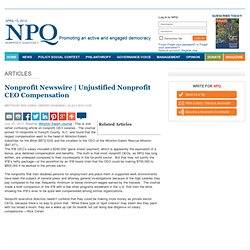

What’s in a Name? Benefits of the President/CEO Title. In a bit of an unusual step, I am posting this article in two parts because of the length.

Eugene Fram brings us a topic worthy of discussion. Certainly game changing, the decision to use Chief Executive Officer versus Executive Director, can say a lot about the organization and even more about the job description of the person at the top. Perhaps it's time to look at all your organizational titles and give them an update where necessary. Bunnie What’s in a Name? By Eugene Fram, Professor Emeritus, E. Over the last 100 years, senior managers of nonprofits typically have held the executive director title. A recent study reports that only 22 percent of trade association chief staff officers hold the president/CEO title. A wide range of nonprofits use the executive director title: churches, human service agencies, trade associations, and medical facilities.
Unjustified Nonprofit CEO Compensation. Related Articles July 25, 2010; Source: Winston Salem Journal | This is one rather confusing article on nonprofit CEO salaries.

The Journal picked 10 nonprofits in Forsyth County, N.C. and found that the largest compensation went to the head of Winston-Salem Industries for the Blind ($572,533) and the smallest to the CEO of the Winston-Salem Rescue Mission ($47,471). The IFB CEO’s salary included a $240,000 “gains share” payment, which is apparently the equivalent of a bonus, plus deferred compensation and benefits. The truth is that most nonprofit CEOs, as NPQ has long written, are underpaid compared to their counterparts in the for-profit sector. But that may not justify the IFB’s hefty package—or the assertion by an IFB board chair that the CEO could be making $700,000 to $800,000 if he worked in the private sector.
Nonprofit executive directors needn’t contend that they could be making more money as private sector CEOs, because there’s no way to prove that. Our Executive Director is Embezzling. It's the phone call no board member wants or ever expects to get: word that the organization's executive director is being investigated by the police for embezzlement.

In this First Person Nonprofit article, Vernon Waldren, board member of the Nonprofit Association of the Midlands in Omaha, Nebraska, talks candidly about how the story unfolded: We got a call from someone at a different nonprofit letting us know that our executive director was probably going to be arrested for embezzlement at their organization, where he was on the board. Our [board] president got that call on a Monday morning, and she called a meeting of the executive committee at 5:00 that evening. What we learned was that this other organization was working with the police to determine whether there was enough evidence for an arrest, and that there probably would be an arrest. My first reaction was disbelief.
One thing that made a big difference was that we had great people on the board. Fast action Two days later. Firing the Executive Director. Boards of directors tend to fall into one extreme or another when it comes to dissatisfaction with the executive director.

Some boards let their dissatisfaction simmer for years without resolution. Other boards are too hasty and fire an executive at the drop of a hat or, more often, abruptly conclude a long period of silent dissatisfaction with a sudden termination. Sometimes just knowing more about how boards fire their EDs can help you relax into working more proactively with yours. Sometimes it's necessary for a board to fire the executive director. In instances of embezzlement or unethical behavior, the need to terminate is clear to everyone. A national CompassPoint study in 2006 found that nearly 30% of departing executive directors were either fired or forced out. Dissatisfaction with the executive director often appears first as rumblings, such as a staff member hinting at problems to a board member, or board committee members confiding their concerns to one another.
How Much to Pay the Executive Director? Nonprofit board members are often puzzled when it comes to setting the salary of the executive director.

On one hand, we want to keep our talented staff; on the other hand, we know the budget is tight. Some legal and practical guidelines: It's maddening and ironic that the press focuses on the extremely rare cases of high salaries for nonprofit executives, when salaries in nonprofits are typically 20% - 40% less than their counterparts in foundations, local government, and the business sector. Mistaken public perception that nonprofit salaries are high has even led to New Jersey now limiting the amount of state funds that can be spent on nonprofit executive salaries. But despite the press, community nonprofit boards are more frequently worried that they are paying their executives too little, a feeling shared by many executive directors themselves.
Legal guidelines As part of preventing "excess compensation," U.S. federal law (Prop. Relative to whose salary? 1. 2. 3. 4.